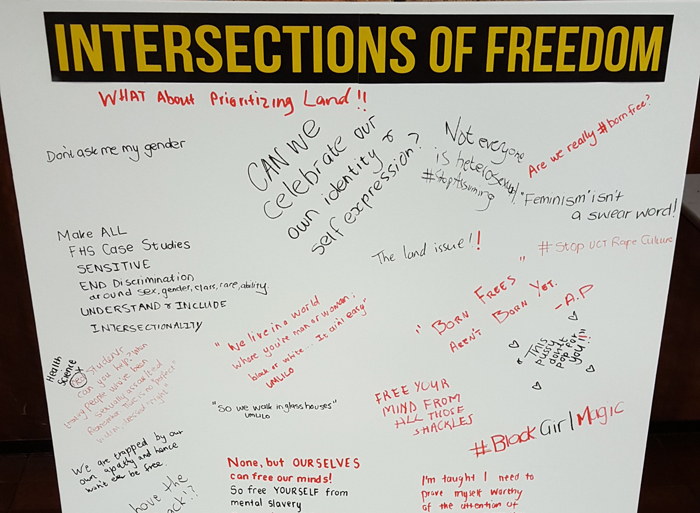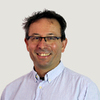HAICU & FHSSC host freedom discussions on UCT's health sciences campus
05 May 2016 | Story Cal Volks. Photo Jamian Heesom-Baron.
In partnership with UCT Survivors and Decolonise Health Sciences, the HIV/AIDS Inclusivity and Change Unit (HAICU) and the Faculty of Health Sciences Students' Council hosted an event on Thursday, 28 April 2016 on the health sciences campus to discuss freedom.
The event was held to celebrate the areas in which students perceive that freedom has been achieved. For example, some students spoke about having developed their own identity while drawing attention to what still needs to be done. Some students said that they don't feel free because land issues have not been adequately addressed. Some students said that they did not yet feel free because of discrimination on the basis of sex or gender, and some brought attention to the impact of rape culture. The students expressed these concerns powerfully both verbally and on a thought wall.
Keabetswe Molelekeng, a member of the of the Health Sciences Students' Council, was the director of ceremonies. Speakers called on health sciences students to play a role in stopping discrimination on the grounds of gender or sex.
Dela Gwala, from UCT Survivors and the chair of the UCT Young Womxn's Network, drew attention to the survivors of sexual violence who have spoken about the way they have been treated by health sciences personnel. She said that survivors are often blamed for sexual violence because they wore the 'wrong' clothes or were in the 'wrong' area. Students were reminded that rape is not the survivor's fault, nor is it because of what the survivor wore or did. Dela Gwala encouraged health sciences students to be better informed about the experiences of students on campus and to be educated in order to address survivors appropriately and give them the utmost care and respect.
Gender activist and a proponent of future kwaai music, Umlilo, sang several songs about what he expressed as being queer in a world that wants to classify people in terms of sex, gender and race. Umlilo also spoke to the issue of violence. The music not only expressed the difficulties that people face, but encouraged the audience to move towards a place of agency around addressing discrimination as well as violence.
The event complements the workshops focusing on HIV, patriarchy, sexual diversity and related issues for vulnerable students that have been held with first-year health sciences students and tutors. The workshops were facilitated by HAICU, the Agents of Change (ACEs) students and Health Sciences Student Council member Jamian Heesom-Baron, together with Professor Geney Gunston and Dr Lorna Olckers. This is in line with HAICU's coordinated response that builds student and staff capacity through curriculum, co-curriculum and social responsiveness initiatives.
The workshops have also focused on the possibility of updating case studies in the first-year health sciences course. This is part of a larger effort around curricula reform that is taking place throughout the faculty and the university.
The event also complemented other events highlighting inclusivity on campus and workshops that have been held by members of the Trans Collective, HAICU and others.
 This work is licensed under a Creative Commons Attribution-NoDerivatives 4.0 International License.
This work is licensed under a Creative Commons Attribution-NoDerivatives 4.0 International License.
Please view the republishing articles page for more information.










